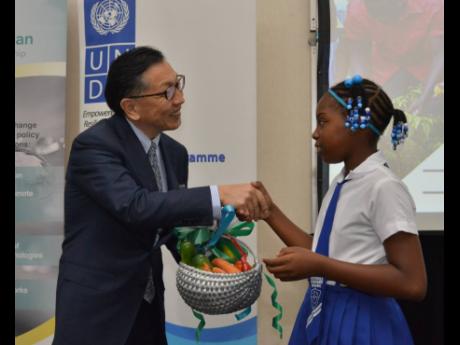Schools, communities benefit from climate-change partnership
At least 70 public education institutions and three communities have benefited from a climate-change partnership forged between the governments of Japan and Jamaica.
Jamaica is among the eight participating Caribbean countries in the Japan-Caribbean Climate Change Partnership (JCCCP), which is aimed at enhancing the capacity of countries in climate-change adaptation and mitigation.
At the information-sharing and closing forum yesterday, Minister without portfolio in the Ministry of Economic Growth and Job Creation Daryl Vaz said that the negative impact of climate change continues to be a major concern for Jamaica.
“The risks are all too familiar for small-island developing states, and this week, we received yet another lesson on how vulnerable we all are,” Vaz said with reference to the devastation unleashed on The Bahamas by Hurricane Dorian.
“Our vulnerability to the impact of climate change cannot be questioned, and as such, we fully recognise that we must seize every opportunity to establish partnerships to address these challenges.”
The JCCCP project was launched in June 2016 with the priority areas being sustainable agriculture and water resources.
Over the three-year period, community-based pilot projects were launched in Richmond Park and Victoria in Clarendon.
... 4H clubs reaping rewards of climate smart gardens
Students of the Victoria and Richmond Park Primary schools in Clarendon have established climate-smart school gardens to enhance food security on their campuses.
Through the 4H clubs, they are now reaping from the farms after years of down time because of a lack of water.
Akilah Elliston, from Richmond Park Primary, has been a member of the club since grade one.
“I joined the club because of the activities. We plant cabbage, tomato, banana, and plantains. I fertilise them and reap them when they are ready,” the grade-six student said.
Hervon Dinnall’s entry into the club was natural because one of his father’s many jobs is that of a yam farmer.
“Mi always help him Saturday day time. [At school] we plant a lot of things. The food goes to the canteen, and Miss Thompson nuh haffi buy so much food again,” said the Victoria Primary student.
Principal of Victoria Primary, Violet Thomas-Thompson, said the rehabilitation of two concrete water- catchment tanks, which provide some 83,000 gallons of water, has added value to the community.
“We are beyond grateful for the investment that has been channelled in our communities. I can reflect on the days when water was so scarce. We had to dismiss school on a regular basis because we could only keep the children at school for part of the day,” Thomas-Thompson said.
She said the gardens have amplified the school’s feeding programme tremendously, and excess crops are sold to the community to assist with the maintenance and upkeep of the gardens.
Farmer Derval McLean, who spoke on behalf of the farming community in Cascade in St Ann, said close to 50 farmers received irrigation systems and a shed, which serves as storage for tools and produce as well as shelter from the sun or rain.
Increased crop yields
The farmers also have access to 50,000 gallons of water for agricultural use and have reported an increase in crop yields.
“We had to travel to the pond every single day for water, and we used donkeys. At times when the donkeys were tired, we had to walk and use jugs and buckets to carry the water,” McLean shared. He added that farmers now have an improved awareness of the impact of climate change and disaster-risk management in agriculture because of the training they received.
The Hilltop Juvenile Facility in St Ann and the Abilities Foundation were also beneficiaries of the Japan Caribbean Climate Change Partnership (JCCCP) programme.
The project ends on September 30, but Eltha Brown, JCCCP National Focal Point, UNDP Jamaica, said plans are in place for the various pilots to be sustained mainly through community monitoring. The Ministry of Health, parish councils, 4H clubs, and the Rural Agricultural Development Agency are some of the other supporting groups.
The draft of a Nationally Appropriate Mitigation Action policy for the water sector has been completed, and it is expected that it will be implemented and led by a designated entity, with clear timelines.

